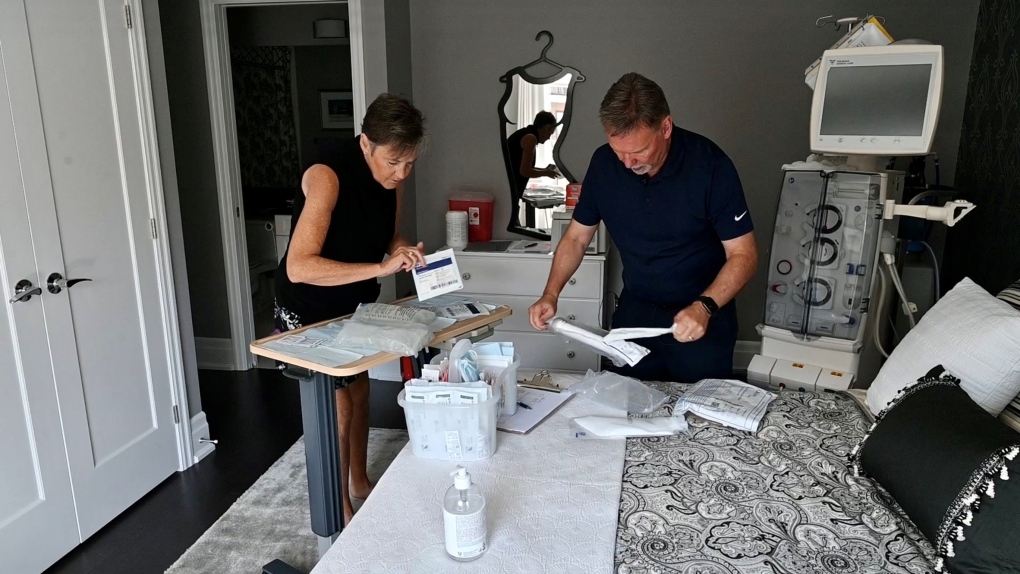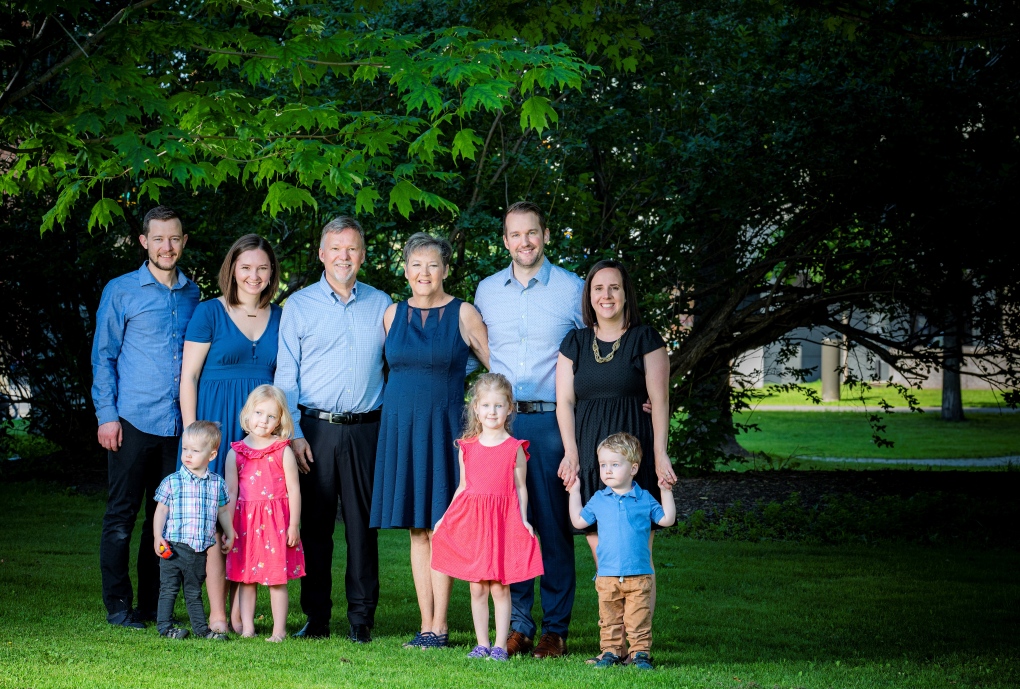The Weight of Waiting: Living with kidney disease, clinging to hope for a second transplant, and a generous gift
When June and Russ Jones are together, they smile easily and laugh often.
“June and I have been together over forty years,” said Russ.
“We hit it off right from the beginning,” smiled June.
The happily married couple is grateful for the life they’ve created and their countless blessings.
“I’ve got a fantastic husband; I have two fantastic kids who married two wonderful people from fantastic families. I have four beautiful grandchildren. Life is good,” said the 61-year-old wife, mother and grandmother.
“Life is really good.”
That life, however, has not been without heartache. June is living with kidney disease.
“She’s had this for the majority of her life, but also the majority of our marriage,” said Russ.
And June’s in need of a transplant.
“So, now, I’ve been waiting nine years for a kidney,” said June, the smile now gone from her expression.
“Hopefully, one of these days. But you know what? You lose hope when you’ve been waiting so long. It’s tough,” she said, her eyes welling with emotion.
After the birth of her second child in 1989, June felt uncharacteristically run down. A doctor diagnosed her with IgA nephropathy, a disease caused by her body’s immune system attacking her kidneys.
“And that was the start of my kidney disease. I had to watch my diet, I was on medications for high blood pressure but for the next ten years, I was pretty good,” said June.
“We were even planning a move to the U.S., until I spoke with my specialist,” said June.
“She said, ‘No, that’s not going to happen.’ And I said, ‘What do you mean?’ She said, ‘You’re going to be on dialysis.’
“That was a total shock to me. We had never even discussed dialysis before.”
When June’s kidneys finally stopped functioning, her doctor’s predictions were confirmed.
“Within two years, I was on dialysis,” she said.
Within six months of starting dialysis, however, June would receive life-changing news. A donor match had been found. June would receive a kidney from a deceased donor.
She still remembers coming home from her son’s hockey practice and being greeted by her daughter.
“I opened up the garage door and my daughter was there. She said ‘Mom, have you heard the news? They’ve got a kidney waiting for you.’”
“To have it come up so quickly, it was unbelievable. It was a miracle,” June said.
“On the way to the hospital I said to my husband, ‘Our life is going to change, again.’”
And indeed, their life did change.
The transplant marked the end of dialysis and the beginning of freedom for June and Russ. Long sessions on a dialysis machine were over. Travel and spontaneous outings were again possible.
“During that period, it was quite an uplifting experience for the both of us. We actually moved to California for three years,” said Russ.
“Life was great. We could travel all over the place. Oh, it was fantastic,” said June.
But in 2013, June became increasingly unwell. Her transplant was failing.
“We came back from the States in 2010 and in 2013, I lost my kidney.
“I had been getting really sick and one day I got a call from one of the nurses at the transplant clinic. She asked that we come in.
“She told me I was losing my kidney. I asked how long I had, and she told me six weeks, max,” June recalled.
“I think I had a month, and it was gone. That was devastating. Devastating.”
“Her original transplant lasted just shy of 15 years,” said husband Russ.
Every second day, for several consecutive hours, June is on hemodialysis at home—a machine that cleans her blood while she rests or sleeps. It can be uncomfortable, restrictive, and at times, painful. She has experienced severe headaches while using it.
 June and Russ Jones prepare a machine for June’s home dialysis treatment (Joel Haslam/CTV News Ottawa)
June and Russ Jones prepare a machine for June’s home dialysis treatment (Joel Haslam/CTV News Ottawa)
Doctors from the Ottawa Hospital have been “amazing” in helping June navigate dialysis.
“I don’t know what I would have done without them,” June said.
Dialysis is not a permanent solution, but until June receives a transplant, it is her only option.
“This is my life. I can’t do anything on the spur of the moment because I have to be home to do dialysis. It definitely makes life more challenging, but I’m still alive and today is a good day,” she said.
Russ helps June set up the dialysis machine every time, offering tireless love and support.
“I give her full credit she has a ton of grit,” he said.
“He’s absolutely amazing. Oh, my God--he’s my saviour for sure,” said June.
June is on a Canada-wide waiting list for a donor kidney and what’s called a “highly-sensitized” list, but finding a donor match is challenging.
“I’ve had two pregnancies, five blood transfusions, and a transplant. That’s put more antibodies into my system, and they fight other organs, so I’m very hard to match,” June said.
“I’ve actually had fifteen people come forward to give me a kidney. There hasn’t been a match yet. So, now I’ve been waiting for nine years. Hopefully, one of these days, but you lose hope when you’ve been waiting for so long,” June said.
June’s immediate family members are not a match. Neither are any of her eight siblings.
“Her siblings have a different blood type, so while a number of them have wanted to donate, they have not been able to,” said Russ.
“It could happen tomorrow; it could never happen.
“It’s not the best life someone can have, but we’re trying to enjoy it as much as we can.”
Russ was the first Chief Financial Officer of Shopify before his retirement. He’s also a board member of the Ottawa Hospital Foundation. The Jones Family recently made a $10-million donation to help build the new hospital.
 The Jones family recently donated $10 million to the Ottawa Hospital’s Campaign to Create Tomorrow. Half of that gift will support kidney research at the hospital and efforts to find a cure. (Joel Haslam/CTV News Ottawa)
The Jones family recently donated $10 million to the Ottawa Hospital’s Campaign to Create Tomorrow. Half of that gift will support kidney research at the hospital and efforts to find a cure. (Joel Haslam/CTV News Ottawa)
“Everyone is going to be touched by a hospital at some point in their life,” he said.
Half of the Jones family’s transformative gift will support kidney research and the ongoing mission to find a cure.
“To make advancements in terms of kidney disease, but also on the clinical side, to make life better for people on dialysis,” said Russ.
“And we’re hoping that this turns into something where you don’t have to wait for someone to pass away to get an organ. Perhaps there’s a way to artificially do it or a way to do it through some other mechanisms. We have some incredible research talent and it’s very rewarding to see some of their advancements.”
“This is a once-in-a-lifetime opportunity for people to support the Ottawa Hospital,” he said.
For now, June Jones continues her wait.
“It’s tough.”
The middle child of nine from a close-knit Ottawa Valley farm family is trying to stay strong for her loving husband, children and grandchildren.
“I’m a fighter.”
And now, with that family, June’s fighting for the ultimate prize.
“My greatest hope today is that I get a transplant,” she said.
“It’s an amazing miracle when you get that kidney, when you get that call.”
The “Campaign to Create Tomorrow” in support of the Ottawa Hospital has now raised $233 million of its $500 million goal. You can learn more at ohfoundation.ca
CTVNews.ca Top Stories

opinion Tom Mulcair: Prime Minister Justin Trudeau's train wreck of a final act
In his latest column for CTVNews.ca, former NDP leader and political analyst Tom Mulcair puts a spotlight on the 'spectacular failure' of Prime Minister Justin Trudeau's final act on the political stage.
B.C. mayor gets calls from across Canada about 'crazy' plan to recruit doctors
A British Columbia community's "out-of-the-box" plan to ease its family doctor shortage by hiring physicians as city employees is sparking interest from across Canada, says Colwood Mayor Doug Kobayashi.
'There’s no support': Domestic abuse survivor shares difficulties leaving her relationship
An Edmonton woman who tried to flee an abusive relationship ended up back where she started in part due to a lack of shelter space.
opinion King Charles' Christmas: Who's in and who's out this year?
Christmas 2024 is set to be a Christmas like no other for the Royal Family, says royal commentator Afua Hagan. King Charles III has initiated the most important and significant transformation of royal Christmas celebrations in decades.
Can the Governor General do what Pierre Poilievre is asking? This expert says no
A historically difficult week for Prime Minister Justin Trudeau and his Liberal government ended with a renewed push from Conservative Leader Pierre Poilievre to topple this government – this time in the form a letter to the Governor General.
Baseball Hall of Famer Rickey Henderson dead at 65, reports say
Rickey Henderson, a Baseball Hall of Famer and Major League Baseball’s all-time stolen bases leader, is dead at 65, according to multiple reports.
Arizona third-grader saves choking friend
An Arizona third-grader is being recognized by his local fire department after saving a friend from choking.
Germans mourn the 5 killed and 200 injured in the apparent attack on a Christmas market
Germans on Saturday mourned the victims of an apparent attack in which authorities say a doctor drove into a busy outdoor Christmas market, killing five people, injuring 200 others and shaking the public’s sense of security at what would otherwise be a time of joy.
Blake Lively accuses 'It Ends With Us' director Justin Baldoni of harassment and smear campaign
Blake Lively has accused her 'It Ends With Us' director and co-star Justin Baldoni of sexual harassment on the set of the movie and a subsequent effort to “destroy' her reputation in a legal complaint.


































